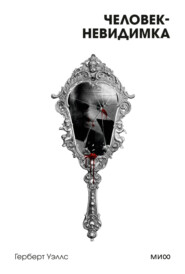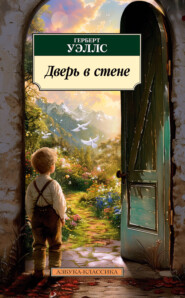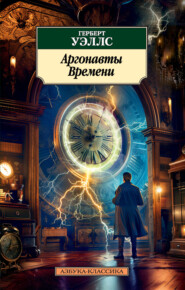По всем вопросам обращайтесь на: info@litportal.ru
(©) 2003-2024.
✖
Tono-Bungay
Настройки чтения
Размер шрифта
Высота строк
Поля
I took the stuff to Thorold, and Thorold had the exquisite agony of discovering two new elements in what was then a confidential analysis. He has christened them and published since, but at the time Gordon-Nasmyth wouldn’t hear for a moment of our publication of any facts at all; indeed, he flew into a violent passion and abused me mercilessly even for showing the stuff to Thorold. “I thought you were going to analyse it yourself,” he said with the touching persuasion of the layman that a scientific man knows and practises at the sciences.
I made some commercial inquiries, and there seemed even then much truth in Gordon-Nasmyth’s estimate of the value of the stuff. It was before the days of Capern’s discovery of the value of canadium and his use of it in the Capern filament, but the cerium and thorium alone were worth the money he extracted for the gas-mantles then in vogue. There were, however, doubts. Indeed, there were numerous doubts. What were the limits of the gas-mantle trade? How much thorium, not to speak of cerium, could they take at a maximum. Suppose that quantity was high enough to justify our shipload, came doubts in another quarter. Were the heaps up to sample? Were they as big as he said? Was Gordon-Nasmyth – imaginative? And if these values held, could we after all get the stuff? It wasn’t ours. It was on forbidden ground. You see, there were doubts of every grade and class in the way of this adventure.
We went some way, nevertheless, in the discussion of his project, though I think we tried his patience. Then suddenly he vanished from London, and I saw no more of him for a year and a half.
My uncle said that was what he had expected, and when at last Gordon-Nasmyth reappeared and mentioned in an incidental way that he had been to Paraguay on private (and we guessed passionate) affairs, the business of the “quap” expedition had to be begun again at the beginning. My uncle was disposed to be altogether sceptical, but I wasn’t so decided. I think I was drawn by its picturesque aspects. But we neither of us dreamt of touching it seriously until Capern’s discovery.
Nasmyth’s story had laid hold of my imagination like one small, intense picture of tropical sunshine hung on a wall of grey business affairs. I kept it going during Gordon-Nasmyth’s intermittent appearances in England. Every now and then he and I would meet and reinforce its effect. We would lunch in London, or he would cone to see my gliders at Crest Hill, and make new projects for getting at those heaps again now with me, now alone.
At times they became a sort of fairy-story with us, an imaginative exercise. And there came Capern’s discovery of what he called the ideal filament and with it an altogether less problematical quality about the business side of quap. For the ideal filament needed five per cent. of canadium, and canadium was known to the world only as a newly separated constituent of a variety of the rare mineral rutile. But to Thorold it was better known as an element in a mysterious sample brought to him by me, and to me it was known as one of the elements in quap. I told my uncle, and we jumped on to the process at once. We found that Gordon-Nasmyth, still unaware of the altered value of the stuff, and still thinking of the experimental prices of radium and the rarity value of cerium, had got hold of a cousin named Pollack, made some extraordinary transaction about his life insurance policy, and was buying a brig. We put in, put down three thousand pounds, and forthwith the life insurance transaction and the Pollack side of this finance vanished into thin air, leaving Pollack, I regret to say, in the brig and in the secret – except so far as canadium and the filament went – as residuum. We discussed earnestly whether we should charter a steamer or go on with the brig, but we decided on the brig as a less conspicuous instrument for an enterprise that was after all, to put it plainly, stealing.
But that was one of our last enterprises before our great crisis, and I will tell of it in its place.
So it was quap came into our affairs, came in as a fairy-tale and became real. More and more real it grew until at last it was real, until at last I saw with my eyes the heaps my imagination had seen for so long, and felt between my fingers again that half-gritty, half soft texture of quap, like sanded moist-sugar mixed with clay in which there stirs something —
One must feel it to understand.
V
All sorts of things came to the Hardingham and offered themselves to my uncle. Gordon-Nasmyth stands but only because he played a part at last in the crisis of our fortunes. So much came to us that it seemed to me at times as though the whole world of human affairs was ready to prostitute itself to our real and imaginary millions. As I look back, I am still dazzled and incredulous to think of the quality of our opportunities.
We did the most extraordinary things; things that it seems absurd to me to leave to any casual man of wealth and enterprise who cares to do them. I had some amazing perceptions of just how modern thought and the supply of fact to the general mind may be controlled by money. Among other things that my uncle offered for, he tried very hard to buy the British Medical Journal and the Lancet, and run them on what he called modern lines, and when they resisted him he talked very vigorously for a time of organising a rival enterprise. That was a very magnificent idea indeed in its way; it would have given a tremendous advantage in the handling of innumerable specialties and indeed I scarcely know how far it would not have put the medical profession in our grip. It still amazes me – I shall die amazed – that such a thing can be possible in the modern state. If my uncle failed to bring the thing off, some one else may succeed. But I doubt, even if he had got both these weeklies, whether his peculiar style would have suited them. The change of purpose would have shown. He would have found it difficult to keep up their dignity.
He certainly did not keep up the dignity of the Sacred Grove, an important critical organ which he acquired one day – by saying “snap” – for eight hundred pounds. He got it “lock, stock and barrel” – under one or other of which three aspects the editor was included. Even at that price it didn’t pay. If you are a literary person you will remember the bright new cover he gave that representative organ of British intellectual culture, and how his sound business instincts jarred with the exalted pretensions of a vanishing age. One old wrapper I discovered the other day runs: —
“THE SACRED GROVE.”
Weekly Magazine of Art, Philosophy, Science and
Belles Lettres
– — —
HAVE YOU A NASTY TASTE IN YOUR MOUTH?
IT IS LIVER
YOU NEED ONE TWENTY-THREE PILL
(JUST ONE.)
NOT A DRUG BUT A LIVE AMERICAN REMEDY
– — —
CONTENTS
A Hitherto Unpublished Letter from Walter Pater
Charlotte Bronte’s Maternal Great Aunt
A New Catholic History of England
The Genius of Shakespeare
Correspondence: – The Mendelian Hypothesis; The Split Infinitive;
“Commence,” or “Begin;” Claverhouse; Socialism and the
Individual; The Dignity of Letters
Folk-lore Gossip
The Stage; the Paradox of Acting
Travel Biography, Verse, Fiction, etc
– — – —
THE BEST PILL IN THE WORLD FOR AN IRREGULAR LIVER
I suppose it is some lingering traces of the Bladesover tradition to me that makes this combination of letters and pills seem so incongruous, just as I suppose it is a lingering trace of Plutarch and my ineradicable boyish imagination that at bottom our State should be wise, sane and dignified, that makes me think a country which leaves its medical and literary criticism, or indeed any such vitally important criticism, entirely to private enterprise and open to the advances of any purchaser must be in a frankly hopeless condition. These are ideal conceptions of mine.
As a matter of fact, nothing would be more entirely natural and representative of the relations of learning, thought and the economic situation in the world at the present time than this cover of the Sacred Grove – the quiet conservatism of the one element embedded in the aggressive brilliance of the other; the contrasted notes of bold physiological experiment and extreme mental immobility.
VI
There comes back, too, among these Hardingham memories, an impression of a drizzling November day, and how we looked out of the windows upon a procession of the London unemployed.
It was like looking down a well into some momentarily revealed nether world. Some thousands of needy ineffectual men had been raked together to trail their spiritless misery through the West Eire with an appeal that was also in its way a weak and insubstantial threat: “It is Work we need, not Charity.”
There they were, half-phantom through the fog, a silent, foot-dragging, interminable, grey procession. They carried wet, dirty banners, they rattled boxes for pence; these men who had not said “snap” in the right place, the men who had “snapped” too eagerly, the men who had never said “snap,” the men who had never had a chance of saying “snap.” A shambling, shameful stream they made, oozing along the street, the gutter waste of competitive civilisation. And we stood high out of it all, as high as if we looked godlike from another world, standing in a room beautifully lit and furnished, skillfully warmed, filled with costly things.
“There,” thought I, “but for the grace of God, go George and Edward Ponderevo.”
But my uncle’s thoughts ran in a different channel, and he made that vision the test of a spirited but inconclusive harangue upon Tariff Reform.
CHAPTER THE SECOND
OUR PROGRESS FROM CAMDEN TOWN TO CREST HILL
I
So far my history of my aunt and uncle has dealt chiefly with his industrial and financial exploits. But side by side with that history of inflation from the infinitesimal to the immense is another development, the change year by year from the shabby impecuniosity of the Camden Town lodging to the lavish munificence of the Crest Hill marble staircase and my aunt’s golden bed, the bed that was facsimiled from Fontainebleau. And the odd thing is that as I come to this nearer part of my story I find it much more difficult to tell than the clear little perspective memories of the earlier days. Impressions crowd upon one another and overlap one another; I was presently to fall in love again, to be seized by a passion to which I still faintly respond, a passion that still clouds my mind. I came and went between Ealing and my aunt and uncle, and presently between Effie and clubland, and then between business and a life of research that became far more continuous, infinitely more consecutive and memorable than any of these other sets of experiences. I didn’t witness a regular social progress therefore; my aunt and uncle went up in the world, so far as I was concerned, as if they were displayed by an early cinematograph, with little jumps and flickers.
As I recall this side of our life, the figure of my round-eyes, button-nosed, pink-and-white Aunt Susan tends always to the central position. We drove the car and sustained the car, she sat in it with a magnificent variety of headgear poised upon her delicate neck, and always with that faint ghost of a lisp no misspelling can render – commented on and illuminated the new aspects.
I’ve already sketched the little home behind the Wimblehurst chemist’s shop, the lodging near the Cobden statue, and the apartments in Gower Street. Thence my aunt and uncle went into a flat in Redgauntlet Mansions. There they lived when I married. It was a compact flat, with very little for a woman to do in it In those days my aunt, I think, used to find the time heavy upon her hands, and so she took to books and reading, and after a time even to going to lectures in the afternoon. I began to find unexpected books upon her table: sociological books, travels, Shaw’s plays. “Hullo!” I said, at the sight of some volume of the latter.

















